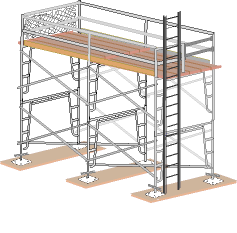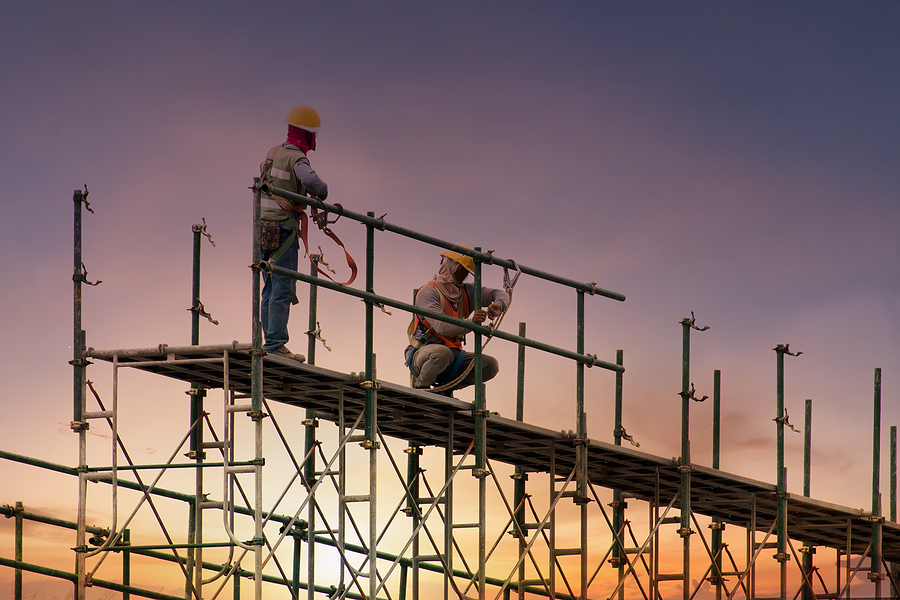Find Reliable Scaffolding Services in Surrey for Your Project Needs
Find Reliable Scaffolding Services in Surrey for Your Project Needs
Blog Article
Discovering the Different Types of Scaffolding Used in Building And Construction Projects
The construction sector depends heavily on various kinds of scaffolding to satisfy details project needs, each offering distinct benefits and applications. Conventional frame scaffolding supplies a tough structure for basic jobs, while put on hold scaffolding is necessary for work on high-rise structures.

Typical Frame Scaffolding
Traditional framework scaffolding is one of the most extensively used approaches in the construction market because of its effectiveness and adaptability. This system includes horizontal and upright frameworks that are assembled to produce a stable system for workers and materials. The main elements consist of upright messages, horizontal ledgers, and angled braces, which together provide a solid framework that can sustain considerable lots.
Among the vital benefits of conventional framework scaffolding is its adaptability to various building projects, ranging from household structures to large commercial structures. The modular layout allows for simple setting up and disassembly, making it reliable for both lasting and temporary tasks. In addition, the system can be tailored in height and width, accommodating different structure layouts and website problems.
Safety is vital in scaffolding applications, and typical structure systems are equipped with guardrails and toe boards to stop drops and make sure employee defense. Normal examinations and adherence to safety and security guidelines are essential in maintaining the integrity of the scaffold (Scaffolding). Overall, standard structure scaffolding stays an essential choice in the construction industry, giving a reliable system for labor and boosting total task effectiveness

Suspended Scaffolding
Put on hold scaffolding supplies a distinct remedy for building tasks that call for accessibility to elevated surfaces, especially in situations where typical frame scaffolding may be impractical. This kind of scaffolding is typically put on hold from the roof or top levels of a framework, utilizing a system of wheels, ropes, and platforms to create a functioning room that can be gotten used to numerous heights.
One of the main benefits of put on hold scaffolding is its flexibility. It can be easily repositioned or reduced to accommodate adjustments in construction demands, making it optimal for tasks such as home window installment, frontage work, and upkeep on high-rise structures. In addition, the minimal impact of put on hold scaffolding allows for better use ground room in urban environments, where space is frequently restricted.
Security is a critical consideration in the usage of put on hold scaffolding. Overall, suspended scaffolding gives a effective and reliable option for accessing hard-to-reach areas in different building and construction circumstances, improving both performance and safety and security on site.
System Scaffolding
System scaffolding, frequently concerned as a modern-day remedy in the scaffolding industry, is composed of pre-engineered elements that can be swiftly constructed and adjusted for various building tasks. Scaffolding. This kind of scaffolding is identified by its modular style, which enables convenience and effectiveness on job sites, suiting architectural needs and different elevations
Typically made from high-strength steel or light weight aluminum, system scaffolding offers enhanced resilience and security. The components include vertical posts, straight ledgers, and diagonal braces, which interconnect safely, guaranteeing a durable structure. The layout frequently incorporates standardized fittings, simplifying setting up and disassembly processes, thereby minimizing labor time and costs.

Rolling Scaffolding
Rolling scaffolding is a flexible alternative to typical fixed scaffolding, made for wheelchair and ease of use on construction websites. This sort of scaffolding contains a platform sustained by frames with wheels, permitting employees to quickly relocate it as required. The movement attribute dramatically improves productivity, as it decreases downtime related to putting together and taking apart dealt with scaffolding.
Normally built from lightweight products such as light weight aluminum or steel, rolling scaffolding provides a tough yet portable remedy for projects needing frequent repositioning - Scaffolding. It is specifically advantageous in jobs such as paint, drywall installation, and electric job, where access to different elevations and locations is essential
Safety is vital in rolling scaffolding layout, with features such as locking wheels to protect against unplanned movement when in use, and guardrails to safeguard employees from falls. Additionally, lots of models are adjustable in elevation, suiting various project demands.
Cantilever Scaffolding

The style of cantilever scaffolding usually entails using braces or arms secured to a building or framework, making it possible for the platform to expand outside securely. Safety and security is vital; thus, these scaffolds have to be engineered to hold up against numerous lots and environmental problems. Routine inspection and maintenance are necessary to make sure architectural stability and employee security.
Cantilever scaffolding is favored for its adaptability and efficient use of room, making it a popular option in urban settings where room restraints prevail. Furthermore, it assists in less complicated accessibility to high elevations, inevitably adding to the overall effectiveness of building Read Full Report tasks. Just like all scaffolding types, appropriate training and adherence to security standards are vital for employees making use of cantilever scaffolding.
Verdict
Traditional structure scaffolding gives security, while put on hold scaffolding supplies convenience for raised tasks. System scaffolding facilitates quick setting up, and rolling scaffolding boosts movement for differing work atmospheres.
Standard frame scaffolding supplies a durable foundation for basic tasks, while put on hold scaffolding is necessary for work on skyscraper structures.Rolling scaffolding is a functional alternative to typical fixed scaffolding, designed for flexibility and simplicity of use on building and construction sites. As with all scaffolding types, proper training and adherence to safety and security requirements are crucial for employees making use of cantilever scaffolding.
Typical framework scaffolding gives stability, while put on hold scaffolding provides flexibility for raised tasks. System scaffolding assists Get the facts in fast assembly, and rolling scaffolding boosts movement for differing job environments.
Report this page